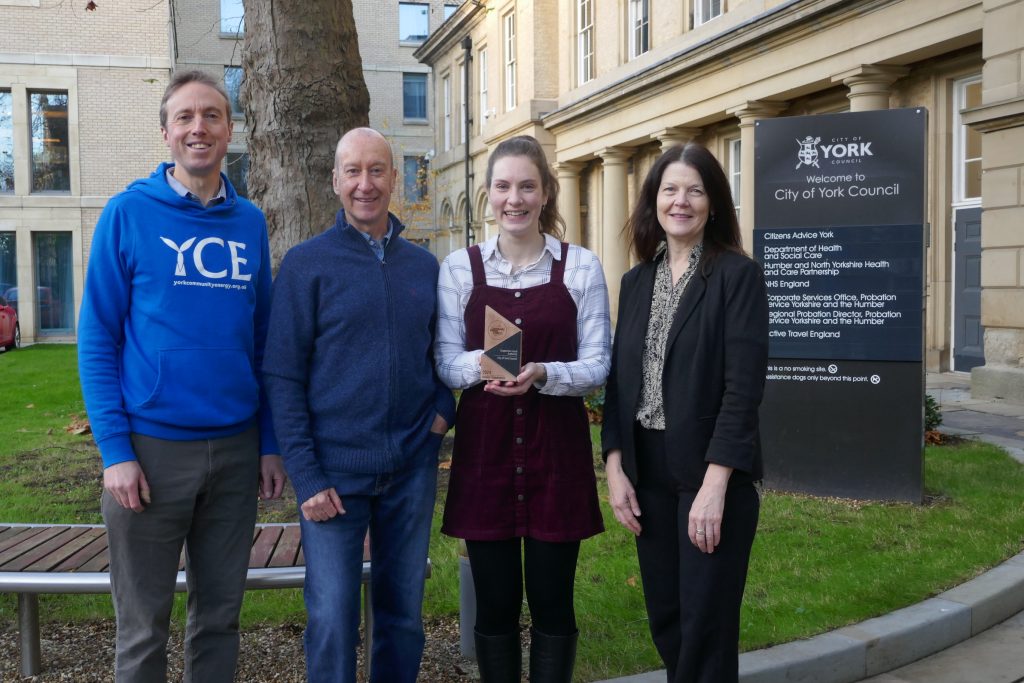
Case Study
2024 award finalist (highly commended) – The City of York Council
The City of York Council

Supportive local authority
- Integrated community energy into the Local Area Energy Plan and Climate Change Strategy.
- Partnered with York Community Energy (YCE) to develop community solar projects on council properties.
- Supported schools to install solar panels through Solar for Schools initiatives.
- Invited YCE to co-lead a £3.5 million Innovate UK project to develop a retrofit ‘One-Stop-Shop’ to decarbonise housing.
The City of York Council has been a cornerstone of support for York Community Energy (YCE) and Solar for Schools (SfS), playing a pivotal role in advancing community energy initiatives and promoting sustainability in York. Their multifaceted support, spanning political leadership and operational facilitation, has been integral to fostering local energy projects, aligning with regional decarbonisation strategies, and ensuring the successful delivery of key initiatives that empower local communities.
The City of York Council has not only endorsed community energy efforts but also integrated them into broader policy frameworks, reinforcing their long-term commitment to local sustainability and decarbonisation. Community Energy has been embedded into both the York and North Yorkshire Local Area Energy Plan (LAEP) and the York Climate Change Strategy. These plans outline community energy as a critical component of local energy transformation and establish YCE as a core delivery partner. This strategic positioning ensures that community energy initiatives remain central to York’s efforts to achieve carbon neutrality, both in policy and practice.
The Council’s role in supporting Solar for Schools (SfS) highlights its commitment to advancing renewable energy at the grassroots level. By reviewing contractual arrangements and recommending participation to schools under its jurisdiction, the City of York Council facilitated the development of a contractual framework that has allowed a pipeline of schools to install solar arrays. The collaboration has not only delivered tangible environmental benefits, but also demonstrated the value of partnerships between the public sector and community-driven initiatives.
This collaboration laid the foundation for a trusted partnership between YCE and the Council. Council officers and political leaders have further helped to promote these successes, showcasing the significant role schools can play in the city’s wider sustainability goals.
The City of York Council has played a crucial role in enabling YCE’s community-owned renewable energy projects. Specifically, the Council has facilitated access to Council-owned properties, allowing YCE to investigate them as potential sites for community rooftop solar arrays. This partnership is supported by YCE’s Community Energy Fund, with a shared goal of expanding local energy generation through solar power.
This collaboration between YCE and the Council underscores the city’s innovative approach to sustainability, where public assets serve as platforms for community-led energy production,
contributing to a more resilient and decentralised energy grid.
York Community Energy’s expertise in energy advice and housing decarbonisation has also been recognised and incorporated into the Council’s efforts to decarbonise the city’s housing stock. The Council has not only provided financial backing through various grants for vulnerable households but also invited YCE to co-lead a £3.5 million Innovate UK project to develop a retrofit ‘One-Stop-Shop’. This project, running until November 2025, aims to design a seamless customer journey for homeowners looking to decarbonize their properties—from outreach and assessment to the actual retrofit works.
The Council’s involvement in this initiative highlights their proactive stance on tackling climate change and improving housing energy efficiency, further demonstrating their leadership in driving decarbonisation in collaboration with trusted community partners.
Recognising the importance of collaboration in accelerating the energy transition, the City of York Council has organised numerous events to foster stakeholder engagement. These have included a ‘hackathon’ following the development of the Local Area Energy Plan (LAEP), a Green Business Forum, and activities through the relaunched York Climate Commission. These forums have brought together public, private, and community stakeholders, encouraging cross-sectoral collaboration to identify new opportunities for community energy generation.
Support for YCE has been consistent across political groups within the City of York Council, reflecting a broad consensus on the importance of community energy. Councillors have taken proactive steps to ensure that political candidates across the spectrum appreciate the value of community energy, both as a movement and as a local partner in delivering decarbonisation policies. This political advocacy has been instrumental in maintaining momentum for community energy initiatives, ensuring they are integrated into future policy directions.
Special recognition is warranted for the Decarbonisation Team within the City of York Council, led by Shaun Gibbons, along with team members Issy and Louisa. Their proactive engagement and willingness to collaborate with YCE have been essential to the success of multiple initiatives. By facilitating connections across Council departments and maintaining regular communication, the Decarbonisation Team has exemplified what it means to be a trusted partner to local energy innovators.
The City of York Council’s commitment to community energy, sustainability, and collaboration has set a benchmark for local authorities across the UK. Their holistic approach—encompassing policy integration, hands-on support for solar and retrofit projects, and fostering cross-sector collaboration—demonstrates how local governments can drive real change in the transition to a low-carbon future. Through their ongoing partnership with York Community Energy and Solar for Schools, the Council is ensuring that York’s communities are empowered to take control of their energy future, making a tangible contribution to the city’s decarbonisation goals.
